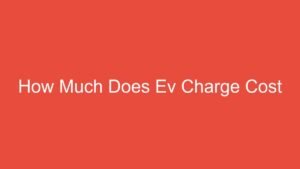
Contents
- How Much Are Electric Cars? Your Comprehensive Guide to EV Costs
- 🛒 Recommended Product
- The Upfront Sticker Price: Where EVs Begin
- Beyond the Sticker: Understanding the Total Cost of Ownership (TCO)
- 🛒 Recommended Product
- Putting It All Together: A Step-by-Step Guide to Estimating Your EV Cost
- Smart Tips for Budget-Conscious EV Buyers
- Common Mistakes to Avoid When Estimating EV Costs
- Conclusion: EVs Can Be More Affordable Than You Think!
- 🛒 Recommended Product
- FAQ
How Much Are Electric Cars? Your Comprehensive Guide to EV Costs
Dreaming of going electric, enjoying instant torque, and reducing your carbon footprint? You’re not alone! Electric vehicles (EVs) are becoming increasingly popular, but one of the first questions most people ask is, “How much do electric cars actually cost?”
It’s a fantastic question, and the answer isn’t as simple as a single price tag. Just like traditional gasoline cars, EV costs can vary wildly. However, the true cost of an electric car goes far beyond its initial purchase price. To truly understand EV affordability, we need to look at the total cost of ownership (TCO), which often paints a much brighter picture than you might expect.
Let’s break down everything you need to know, from the sticker price to long-term savings, in a friendly, easy-to-understand way.
🛒 Recommended Product
The Upfront Sticker Price: Where EVs Begin
At first glance, the upfront cost of an electric car can sometimes appear higher than a comparable gasoline vehicle. However, this gap is narrowing rapidly.
- Entry-Level EVs: You can find new electric cars starting in the low to mid-$30,000s. These are often compact or subcompact models, perfect for city driving and daily commutes.
- Mid-Range EVs: The bulk of the market falls into the $40,000 – $60,000 range. Here, you’ll find more spacious sedans, crossovers, and SUVs with longer ranges and more features.
- Luxury & Performance EVs: Just like gasoline cars, there are high-end electric vehicles that can reach $70,000 and well over $100,000. These offer premium features, superior performance, and the latest technology.
Key takeaway: Don’t let the initial sticker price be your only guide. It’s just the first piece of the puzzle.
Beyond the Sticker: Understanding the Total Cost of Ownership (TCO)
This is where electric cars truly shine and often become more affordable than their gasoline counterparts over time. The TCO includes all expenses associated with owning and operating a vehicle throughout its lifespan.
Step 1: Incentives and Rebates – Saving Money Immediately
This is where the magic begins for many EV buyers! Governments at various levels offer significant incentives to encourage EV adoption.
- Federal Tax Credits: The U.S. federal government offers tax credits for eligible new and sometimes used electric vehicles. These credits can be substantial, often up to $7,500 for new vehicles (as of current regulations, subject to change and specific vehicle/buyer eligibility criteria). It’s crucial to check the most current information and eligibility requirements for both the vehicle and your income.
- State and Local Incentives: Many states, counties, and even cities offer their own incentives, which can include:
- Rebates: Direct money back on your purchase or lease.
- Tax Credits: State-specific tax reductions.
- HOV Lane Access: Permits for single drivers to use carpool lanes.
- Reduced Registration Fees: Though sometimes EVs can have higher registration fees in certain areas (see Step 6).
- Charging Infrastructure Grants: Help with the cost of installing a home charger.
Tip: Always research incentives available in your specific area before you buy. They can make a huge difference in the effective purchase price.
Step 2: “Fueling Up” – Charging Costs (Savings Over Time)
This is one of the biggest long-term savings for EV owners.
- Home Charging (Most Affordable): The vast majority of EV charging happens at home, usually overnight. Charging at home, especially with a Level 2 charger, means you’re paying your residential electricity rates. Charging at home is generally far cheaper than buying gasoline.
- How to estimate: Look at your electricity bill (cost per kWh). An average EV consumes about 3-4 miles per kWh. A full charge might cost you anywhere from $5 to $15, depending on your electricity rates and battery size. This is significantly less than filling a gas tank!
- Home Charger Installation: You’ll likely want a Level 2 (240V) charger installed at home for faster charging. The cost for the charger unit itself can range from $300-$800, plus installation by an electrician, which could be another $200-$1,500 or more, depending on your electrical panel and wiring needs. Don’t forget to budget for this initial setup cost!
- Public Charging:
- Level 2 Public Chargers: Often found at workplaces, shopping centers, or hotels. They might be free, subscription-based, or pay-per-use, but are typically more expensive per kWh than home charging.
- DC Fast Charging: These are the fastest public chargers, essential for road trips. They are also the most expensive per kWh, but still often cheaper than gasoline for the equivalent range. Prices vary widely by provider and location.
Common Mistake to Avoid: Underestimating the cost of home charger installation or forgetting it entirely. This is an important upfront investment for convenience and savings.
🛒 Recommended Product
Step 3: Maintenance – Often Lower than Gasoline Cars
This is another area where EVs save you money. Electric cars have:
- Fewer Moving Parts: No engine, no transmission, no spark plugs, no exhaust system, no timing belt. This means no oil changes, no transmission fluid changes, and far fewer components that can break down.
- Reduced Brake Wear: EVs use regenerative braking, where the electric motor slows the car down and recaptures energy, reducing wear and tear on the physical brake pads and rotors. They still have traditional brakes, but you’ll use them less often.
- Battery Longevity: EV batteries are designed to last for many years and miles. Most manufacturers offer long warranties on the battery pack (typically 8 years or 100,000 miles, sometimes more), so major battery replacement costs are rare within the typical ownership period.
Expect to save hundreds, potentially thousands, of dollars over the lifespan of the car on routine maintenance.
Step 4: Insurance – Can Vary
EV insurance costs can be a mixed bag.
- Potentially Higher: Some EVs might have higher insurance premiums due to their advanced technology, potentially higher repair costs (especially if specialized EV components are damaged), and sometimes a higher initial purchase price.
- Potentially Lower: As EVs become more common and repair networks grow, and as safety features improve, insurance costs may stabilize or even decrease. Discounts for eco-friendly vehicles or certain EV safety features might also apply.
Tip: Always get insurance quotes for specific EV models before purchasing.
Step 5: Depreciation & Resale Value
Historically, EVs sometimes depreciated faster than comparable gasoline cars, mainly due to evolving battery technology and shifting incentives. However, this trend is changing rapidly.
- Improving Resale Value: With growing demand, higher gas prices, and longer battery ranges, used EVs are holding their value much better than in previous years.
- Market Dependent: Resale value will still depend on the specific make, model, condition, battery health, and market demand in your area.
Step 6: Other Potential Savings or Costs
- Taxes and Fees: Some states offer reduced registration fees for EVs, while others might have slightly higher fees to compensate for lost gasoline tax revenue.
- HOV Lane Access: As mentioned, some regions allow single EV drivers to use High-Occupancy Vehicle lanes, saving time on commutes.
- Parking Discounts: Some cities offer discounted or free parking for EVs.
Putting It All Together: A Step-by-Step Guide to Estimating Your EV Cost
Ready to figure out what an EV might cost you? Follow these steps:
- Determine Your Realistic Budget: Just like any car purchase, know what you’re comfortable spending on the initial vehicle. Remember to factor in potential down payments and monthly loan payments.
- Research EV Models that Fit Your Needs: Consider your desired range, size, features, and brand preferences. This will give you a ballpark for the sticker price.
- Factor In All Available Incentives:
- Check for federal tax credits for the specific models you’re considering.
- Look up state and local rebates or tax credits in your area.
- Subtract these potential savings from the sticker price to get your effective purchase cost.
- Estimate Your Charging Costs:
- Calculate your average daily/weekly mileage.
- Find your residential electricity rate (per kWh).
- Estimate how much you’d save annually compared to your current gasoline expenses.
- Budget for home charger installation (if you don’t already have one) as an upfront cost.
- Consider Maintenance and Insurance:
- Acknowledge the likely savings on maintenance.
- Get specific insurance quotes for the models you’re interested in.
- Calculate Long-Term Savings: Over 5-10 years, tally up your estimated savings on “fuel” and maintenance. You might be surprised at how quickly an EV can pay for its initial premium (if there was one).
Smart Tips for Budget-Conscious EV Buyers
- Consider a Used EV: The used EV market is growing, offering fantastic value. You might still qualify for a federal tax credit on eligible used EVs!
- Leasing vs. Buying: Leasing can sometimes be a good option for EVs, as the manufacturer or dealership may pass through the federal tax credit as a capitalized cost reduction, effectively lowering your monthly payments without you having to wait for tax season.
- Prioritize Range Realistically: Don’t pay for more range than you truly need. If most of your driving is local, a shorter-range EV will be less expensive and still perfectly adequate.
- Charge Smartly: If your utility offers time-of-use rates, charge during off-peak hours when electricity is cheapest.
- Shop Around for Insurance: Don’t settle for the first quote. Different providers will offer different rates for EVs.
- Don’t Forget Dealer Fees: Just like with gasoline cars, be aware of documentation fees, delivery charges, and other potential add-ons.
Common Mistakes to Avoid When Estimating EV Costs
- Ignoring Incentives: Failing to research and apply for federal, state, and local incentives is like leaving money on the table!
- Forgetting Home Charger Installation: While not strictly part of the car’s price, this is a crucial initial investment for convenient and cost-effective EV ownership.
- Only Looking at Public Charging Costs: Relying solely on public fast chargers will make EV ownership more expensive. The real savings come from home charging.
- Overbuying Range: Purchasing an EV with a 300+ mile range when you only drive 30 miles a day will unnecessarily increase your upfront cost.
- Not Budgeting for Insurance: While maintenance is often lower, insurance can be variable, so get a solid estimate beforehand.
- Failing to Compare TCO: Focusing only on the sticker price and not considering the long-term savings on “fuel” and maintenance is a major oversight.
Conclusion: EVs Can Be More Affordable Than You Think!
While the initial sticker price of an electric car might sometimes seem higher, the real affordability of an EV becomes clear when you look at the total cost of ownership. With generous incentives, significantly lower “fuel” (electricity) costs, and reduced maintenance, electric cars can often save you thousands of dollars over their lifespan compared to a comparable gasoline vehicle.
🛒 Recommended Product
By doing your research and considering all the factors, you’ll find that stepping into the electric future is not only good for the planet but can also be good for your wallet. Happy driving!
FAQ
Q. What is the average upfront purchase price of an electric car compared to a gasoline car?
A. The initial purchase price of an electric car is often higher than a comparable gasoline car, though this gap is rapidly narrowing as more models enter the market and technology advances. Entry-level EVs can start around $30,000 to $40,000, while premium models can exceed $70,000 or more. However, the total cost of ownership often makes EVs more competitive in the long run.
Q. Are there any government incentives or tax credits available for buying an electric car?
A. Yes, many governments offer significant incentives to encourage EV adoption. These can include federal tax credits (e.g., up to $7,500 in the U.S. for eligible vehicles), state or local rebates, grants, or even reduced registration fees. These incentives can substantially lower the effective purchase price, making EVs more accessible. Eligibility often depends on the vehicle’s manufacturing location, battery capacity, and the buyer’s income.
Q. How much does it cost to charge an electric car compared to fueling a gasoline car?
A. Charging an electric car is generally much cheaper than buying gasoline for a comparable internal combustion engine (ICE) vehicle. The exact cost depends on your local electricity rates (which can range from 10 to 30 cents per kilowatt-hour or more) and the car’s efficiency. On average, driving 15,000 miles a year, electricity costs could be $500-$1,000, whereas gasoline for a similar distance could easily be $1,500-$2,500 or more, depending on gas prices.
Q. What are the maintenance costs like for electric cars compared to gasoline cars?
A. Electric cars typically have significantly lower maintenance costs than gasoline cars. They have fewer moving parts, no oil changes, spark plug replacements, complex exhaust systems, or fuel filters. Common maintenance for EVs includes tire rotations, brake checks (regenerative braking reduces wear on brake pads), cabin air filters, and occasional fluid checks (e.g., for battery or motor cooling systems). This often results in savings of several hundred dollars per year.
Q. How much does it cost to install a home charging station (Level 2)?
A. The cost of installing a Level 2 home charging station varies but typically ranges from $500 to $2,000. This includes the charger unit itself (often $300-$700) and the electrician’s labor and materials to wire it into your home’s electrical panel. The final price depends on the complexity of the installation, such as the distance from your panel to the charging location, and whether your existing electrical system needs upgrades. Some utility companies or local governments offer rebates for charger installation.
Q. What is the lifespan of an EV battery, and how much does a replacement cost?
A. EV batteries are designed to last for a very long time, often exceeding the lifespan of the vehicle itself. Most manufacturers provide extensive warranties, typically 8 years or 100,000 miles (sometimes more) for the battery, guaranteeing a certain percentage of its original capacity. While full battery replacement costs were historically very high ($10,000-$20,000+), they are steadily decreasing. However, full replacement is rare; often, only individual modules need repair or replacement, and such issues are uncommon within the car’s useful life.
Q. Do electric cars hold their value well over time?
A. Historically, many electric car models, especially popular ones with good range and features, have held their value quite well, sometimes even better than comparable gasoline vehicles. This is partly due to strong consumer demand, continuously evolving technology, and lower running costs. Factors influencing resale value include battery health, overall vehicle condition, remaining range, brand reputation, and market demand for specific models. As the EV market matures and battery technology advances, residual values will continue to evolve.
Related Articles
How Much Is a Corvette
How Much Does a Corvette Cost? Your Ultimate Guide to Unlocking the Dream Ah, the Corvette. Just uttering the name conjures images of sleek lines, exh…
How Much Is a Grand Wagoneer
How Much Is a Grand Wagoneer? Your Complete Guide to Understanding the Price Tag The Grand Wagoneer. Just the name conjures images of luxurious comfor…
How Much Is a Mclaren 720s
How Much Is a McLaren 720S? Your Ultimate Guide to Understanding the Price Tag The McLaren 720S. Just the name conjures images of blistering speed, ae…
Affiliate Disclosure: As an Amazon Associate, I earn from qualifying purchases made through links on this site.















